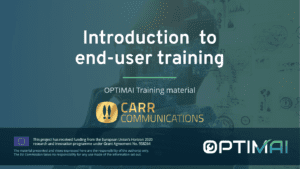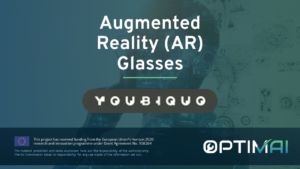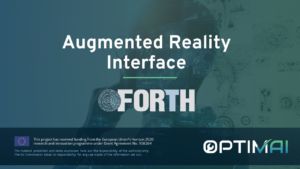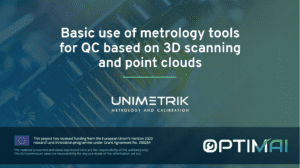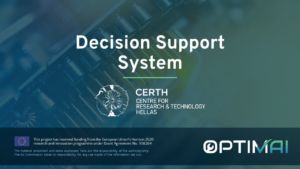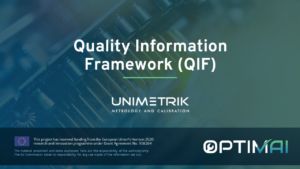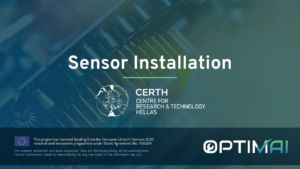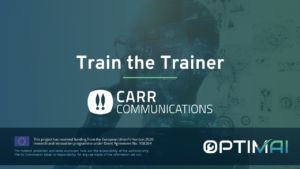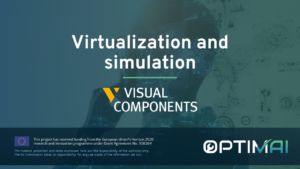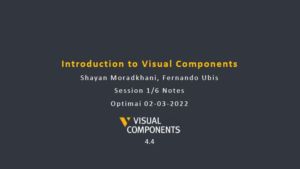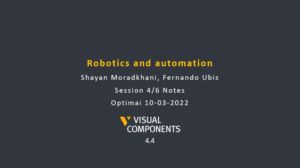Training Catalogue
Welcome to the OPTIMAI Training catalogue
The OPTIMAI training catalogue introduces relevant end-users and operators to the OPTIMAI concept and offers training in the use of the OPTIMAI tools. The catalogue contains a broad range of instructional presentations, learning videos and guidelines. The primary purpose of the training material is to provide end users with a good understanding of the OPTIMAI technologies, associated rights and requirements as well as relevant supporting resources. Step-by-step guides and illustrated walkthroughs help users familiarise themselves with the parts covered in the training.
The catalogue is divided into 15 user-friendly standalone modules. Each module is openly available to view and download.
Note to interested users external to the OPTIMAI project: please contact the relevant OPTIMAI partner in advance if you intend to reuse, distribute, remix, adapt, or build upon the material in any medium or format.
Brief description: In this module, you will learn about end-user training, about why it is important, about what is included in the training catalogue and about what the learning objectives are.
Format: Presentation (PDF)
Target groups: OPTIMAI end-users and external stakeholders interested in end-user training.
Language: English
Point of contact: Carr Communications
Latest update/review: March 2024
Download: PDF
Brief description: In this module, you will learn about the OPTIMAI Augmented Reality (AR) glasses and their role in providing real-time assistance on the shop floor. You will learn about the device features, usage and interactive controls.
Format: Presentation (PDF)
Target groups: OPTIMAI end-users and external stakeholders interested in context aware AR glasses for better human-machine collaboration.
Language: English
Point of contact: Youbiquo
Latest update/review: March 2024
Download: PDF
Brief description: In this module, you will learn how the OPTIMAI Augmented Reality (AR) interface is used for human-machine interaction in the OPTIMAI pilot sites; how the virtual elements are displayed in the end-users’ field of vision through the OPTIMAI smart glasses; and how the adaptive and adaptable graphical user interface (GUI) is visualized and how it allows users to address any deficiencies on the production line in situ.
Format: Presentation (PDF)
Target groups: OPTIMAI end-users and external stakeholders interested in novel AR applications and visual analytics.
Language: English
Point of contact: The Institute of Computer Science (ICS) of FORTH – Foundation for Research and Technology Hellas
Latest update/review: March 2024
Download: PDF
Brief description: In this module, you will learn about the use of metrology tools for quality control based on 3D scanning and point clouds. More specifically, you will learn about some of the key concepts of metrology, quality control sensors and software, the reference architecture of the quality control solution, and basic use of the solution.
Format: Presentation (PDF)
Target groups: OPTIMAI end-users and external stakeholders interested in the use of metrology tools.
Language: English
Point of contact: Unimetrik
Latest update/review: March 2024
Download: PDF
Brief description: In this module, you will learn about worker-focused legal aspects of the OPTIMAI pilots. You will learn about the General Data Protection Regulation (GDPR), about consent and legitimate interest, data processing and rights of data subjects.
Format: Video with audio and presentation (PDF)
Target groups: OPTIMAI end-users and external stakeholders interested in data protection and employees’ rights.
Language: English
Point of contact: Trilateral Research
Latest update/review: March 2024
Download: PDF
Brief description: In this module, you will learn how to use the OPTIMAI Decision support system. You will learn about how it supports different actors on the shop floor in their daily work. You will be presented with the interface that is easy to use, easy to learn how to use, available on multiple devices and personalized and adapted to the context, the preferences and behaviour of the user. You will learn about how the DSS notifies the user about the detection of defects, anomalies and suboptimal machinery operation in manufacturing processes.
Videos included:
- Introduction to the Decision Support System
- Administration Manage Devices & Processes & Store Activity on Blockchain
- Administration: Manage Devices and Processes and Configure AI Models
- Automatic Near Real-Time Defect Detection
- Defect Detection in the Production Line
- Monitoring and Predicting Measurements & Defects in the Production Line
- Monitoring Measurements During Quality Inspection
Format: Presentation (PDF), videos with audio/subtitles
Target groups: OPTIMAI end-users and external stakeholders interested in novel shop floor applications designed to improve efficiency and decision making in the production chain.
Language: English
Point of contact: Centre for Research and Technology Hellas (CERTH-ITI)
Latest update/review: March 2024
Download: PDF
Brief description: In this module, you will learn about quality control sensors for defect detection and production monitoring, and more specifically about the role of industrial vision sensors in OPTIMAI. To help you familiarize yourself with the EyeVision software, this module offers you access to the EyeVision Wiki page, tutorials in the EyeCademy, webinars and technical support.
Format: Presentation (PDF)
Target groups: OPTIMAI end-users and external stakeholders interested in industrial vision sensors.
Language: English
Point of contact: Eye Vision Technology GMBH
Latest update/review: March 2024
Download: PDF
Brief description: In this module, you will learn about hand gesture recognition, the AI method deployed in OPTIMAI for understanding the operator’s motives in the factory floor using the AR glasses. You will familiarise yourself with how hand gesture recognition is performed in the feed from the AR glasses aiming to understand the operator’s intentions.
Format: Presentation (PDF)
Target groups: OPTIMAI end users and external stakeholders interested in hand gesture recognition.
Language: English
Point of contact: Centre for Research and Technology Hellas (CERTH-ITI)
Latest update/review: March 2024
Download: PDF
Brief description: In this module, you will learn about the OPTIMAI Intelligent Marketplace helping manufacturing ecosystem players to easily decrease scrap within their production lines and accompanied services. You will be able to follow step-by-step screen recordings explaining how to register an organisation, how to add a document, how to add a piece of scrap, and how to enter AI algorithms.
Videos included:
- OPTIMAI Marketplace – Document Library
- OPTIMAI Marketplace – AI Algorithm Addition
- OPTIMAI Marketplace – Scrap Addition
- OPTIMAI Marketplace – Registration of an Organisation
Format: Screen recording videos
Target groups: OPTIMAI end-users and external stakeholders interested in the intelligent marketplace, AI sharing and scrap re-use.
Language: English
Point of contact: ENGINEERING Ingegneria Informatica S.p.A.
Latest update/review: March 2024

Brief description: In this module, you will learn about the QIF standard and about its role in OPTIMAI. This module defines QIF and explains who is involved. You will be familiarised with the QIF Version 3.0 Information Architecture and the QIF Results Information Model. Finally, you will learn how to approach a QIF XML document.
Format: Presentation (PDF)
Target groups: OPTIMAI end users and external stakeholders interested in the QIF community.
Language: English
Point of contact: UNIMETRIK
Latest update/review: March 2024
Download: PDF
Brief description: In this module, you will learn about worker-focused ethical aspects of the OPTIMAI pilots. The module covers the ethics research framework applicable to OPTIMAI, principles for ethical trustworthy AI, human autonomy, human dignity, voluntariness, informed decision-making, risk minimisation, prevention of harm, fairness and explicability.
Format: Presentation (PDF)
Target groups: OPTIMAI end-users and external stakeholders interested in ethical principles and responsible research.
Language: English
Point of contact: Universitat Autònoma de Barcelona, Institute of Law and Technology (IDT)
Latest update/review: March 2024
Download: PDF
Brief description: In this module, you will learn about quality control sensors for defect detection and production monitoring. This module explains 1) the installation of a modular supporting device for various types of cameras; 2) the installation of the hardware setup for automatic calibration of an elevator valve block.
Format: Presentation (PDF)
Target groups: OPTIMAI end-users and external stakeholders interested in smart sensors for production quality control.
Language: English
Point of contact: Centre for Research and Technology Hellas (CERTH-ITI)
Latest update/review: March 2024
Download: PDF
Brief description: In this module, you will learn how to understand the role and identify the skills of an effective trainer; develop the skills to create training objectives, activities and materials for planned training activities; identify tools, techniques and approaches for the assessment of learning; and demonstrate the skills required for the effective delivery of training programmes.
Format: Presentation (PDF)
Target groups: OPTIMAI team / project leaders responsible for facilitating and delivering technical and non-technical training in the end-user organisations; external stakeholders in the private, public or community sector looking to improve their facilitation skills and to train others.
Language: English
Point of contact: Carr Communications
Latest update/review: March 2024
Download: PDF
Brief description: In this module, you will familiarise yourself with the 3D simulation platform used to create digital models in OPTIMAI. You will learn how to build such virtual models in OPTIMAI following a process aligned with the life cycle of the production system. This module provides an introduction to Visual Components, to process modelling and to robotics and automation. It also provides links to a training library in the Visual Components Academy.
Format: Presentations (PDFs)
Target groups: OPTIMAI end-users and external stakeholders from any sector interested in novel virtualization and simulation approaches.
Language: English
Point of contact: Visual Components
Latest update/review: March 2024
Download:
Brief description: In this module, you will learn about worker-focused legal aspects of the OPTIMAI pilots. This module covers employee and equality rights, including dismissal and discrimination, and health and safety aspects including risk assessments and health and safety officers and developments.
Format: Video with audio, presentation (PDF)
Target groups: OPTIMAI end-users and external stakeholders interested in employee and equality rights as well as health and safety.
Language: English
Point of contact: Trilateral Research
Latest update/review: March 2024
Download: PDF
DISCLAIMER
The information contained in this training catalogue is for informational purposes only. The information is provided by the OPTIMAI consortium and whilst we endeavour to keep the information up-to-date and correct, we make no representations or warranties of any kind, express or implied, about the completeness, accuracy, reliability, suitability or availability with respect to the website or the information, products, services, or related graphics contained on the website for any purpose. Any reliance you place on such information is therefore strictly at your own risk.
In no event will we be liable for any loss or damage including without limitation, indirect or consequential loss or damage, or any loss or damage whatsoever arising from loss of data or profits arising out of or in connection with the use of the information presented on this website.
The sole responsibility for the content of this website lies with the authors. It does not necessarily reflect the opinion of the European Union. Neither the European Health and Digital Executive Agency (HaDEA) nor the European Commission are responsible for any use that may be made of the information contained therein.




